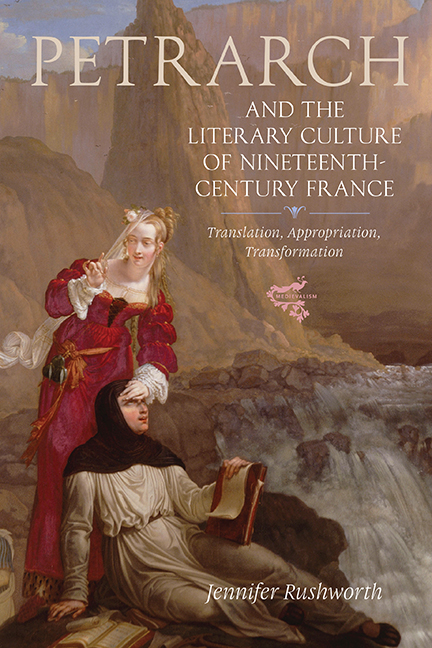 Petrarch and the Literary Culture of Nineteenth-Century France
Petrarch and the Literary Culture of Nineteenth-Century France Book contents
- Frontmatter
- Dedication
- Contents
- Acknowledgements
- Note on English Translations
- Introduction: Local History, Local Stories
- I Translations
- II Rewritings
- Conclusion: Petrarch and Patriotism
- Appendix 1 A Chronological Survey of Translations of Petrarch's Italian Poetry (the Canzoniere and Triumphi) between 1764 and 1903 in France
- Appendix 2 Translations of the Opening Stanza of RVF 126 from Voltaire (1756) to Brisset (1903)
- Bibliography
- Index
- Miscellaneous Endmatter
Conclusion: Petrarch and Patriotism
Published online by Cambridge University Press: 09 May 2017
- Frontmatter
- Dedication
- Contents
- Acknowledgements
- Note on English Translations
- Introduction: Local History, Local Stories
- I Translations
- II Rewritings
- Conclusion: Petrarch and Patriotism
- Appendix 1 A Chronological Survey of Translations of Petrarch's Italian Poetry (the Canzoniere and Triumphi) between 1764 and 1903 in France
- Appendix 2 Translations of the Opening Stanza of RVF 126 from Voltaire (1756) to Brisset (1903)
- Bibliography
- Index
- Miscellaneous Endmatter
Summary
WAS PETRARCH FRENCH? This controversial question has been at the heart of this book. In the Introduction, I drew on passages from Piot and Cochin, at either end of the nineteenth century, to the effect that Petrarch was French through his upbringing, education, residence, and love for Laura. The same point had already been made earlier and more forcibly by the abbé de Sade in his Mémoires pour la vie de François Pétrarque, first in the polemical prefatory letter to his Italian readers (also cited in the Introduction) and more generally in his claim for the Avignonese—and indeed specifically Sadean—identity of Petrarch's beloved, Laure de Sade, née de Noves. In Part I, Petrarch's Frenchness was found to have been further asserted and promoted in the translation into French of his Italian poetry as well as carefully chosen parts of his Latin works across the nineteenth century, with the 1840s and 1870s particularly productive periods. Here the question concerned not only the Frenchness of Petrarch, but more especially which parts of Petrarch's corpus had to be ignored or privileged in order to support this identification. In contrast, Chapter 4 also acknowledged the regional claims on Petrarch, which posed a more local counter-narrative to the nationalistic story of a French Petrarch. Such local claims often boasted of Petrarch's connections with Avignon and Vaucluse particularly around key Petrarchan anniversary dates (1804, 1874, 1904), and were most explicitly expressed in the act of translating Petrarch not into French, but rather into Provençal, an act in which the Provençal group of poets known as the Félibrige were especially implicated.
In Part II, we saw how nineteenth-century French Petrarchism was manifested not only in the act of translation but also in two different modes of rewriting, poetry and prose. The former uncovered translators as poets in their own rights, interrogated the motivations for the production of Petrarchan poetry around particular anniversary dates, and traced Petrarch as a touchstone for Lamartine and as a figure of more transitory but still keen attention for Hugo, Musset, and Gautier. The latter, finally, followed Petrarch as a key influence on the French novel from Rousseau's La Nouvelle Héloise to Sand's Adriani.
- Type
- Chapter
- Information
- Petrarch and the Literary Culture of Nineteenth-Century FranceTranslation, Appropriation, Transformation, pp. 233 - 252Publisher: Boydell & BrewerPrint publication year: 2017
